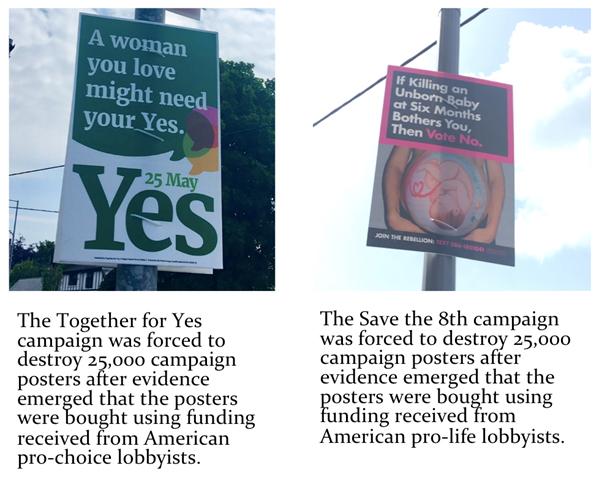When you go to the polls on election day, you consider what you know about a candidate or an issue before you place your vote. But fake news may lead you to question the accuracy of what you know. We know that voters can believe that a fake news story is true, but our recent research went one step further to study the effects of fake news on voters’ memories for completely fabricated events.
In 2018, a referendum was held in Ireland to decide whether the constitutional ban on abortion would be repealed. The campaigns were highly emotional and, because there was a great deal of suspicion and accusations of fake news by both sides, voters were urged to be critical news consumers.
In the week preceding polling day, we showed over 3000 research participants some news stories related to the abortion referendum and asked about their memories for these events. Among the true news stories were some fake stories that we fabricated for the study. All participants saw a fake story concerning illegal campaign posters, but some participants saw a version that implicated the Yes (pro-choice) side and other participants saw a version that implicated the No (pro-life) side. The stories looked like this:

Figure 1: Fake news stories concerning illegal posters used in our study. These stories were entirely fabricated for the purpose of the study, and all participants saw either the Yes version (left) or the No version (right).
Our results showed that many participants reported remembering these fabricated events, with most of them citing a specific source where they had seen the story before, reporting that they had seen it on TV, in a newspaper, or on social media. Some participants even situated the event at a specific point in time. For example, one participant said “I had my mind made up prior to these posters, however, after this story I was disinterested in the No campaign as I didn’t agree with the involvement of other countries in our country’s decisions.” Other participants even added new details such as specifying how the posters were destroyed. One said “I don’t think anything wrong happened and the posters shouldn’t have been burned.” These findings show that rich false memories can form from a simple piece of misinformation.
As you read about this research, you may think that you wouldn’t be susceptible to such a fake news story. This is a common response, so we wondered whether certain people or certain stories are particularly likely to create false memories. Although Yes and No voters did not differ in their overall susceptibility to fake news, we found that participants were more likely to report a false memory when the content of the fake story agreed with their own beliefs. This was true for both the Yes and No sides and is in line with studies showing that information that is consistent with our beliefs tends to feel true, even when it’s not. In addition, the tendency to create false memories for offenses perpetrated by the other side was particularly strong for participants who scored lower on a short IQ test.
Finally, we wondered whether warning participants about fake news would eliminate these effects. So, in another study, we told participants that they may have been exposed to fake news and then asked them to reconsider the stories they had seen and select any that were fake. Even when warned, 70% of those who had reported a false memory failed to retract it and continued to report confidence in their memory. Moreover, participants were less than half as likely to identify a story as fake if the story was in line with their beliefs, and this effect was stronger for those with lower cognitive ability.
Our memories directly impact our behaviour, so the next question is whether this kind of false memory can change how someone intends to vote. This question is difficult to test ethically in a real election or referendum, but there is strong evidence that false memories can affect behavior in other real-life situations. For example, a number of studies have found that, after forming a false memory for getting sick from eating a particular food, participants were less likely to consume that food in future, and these effects sometimes persisted for months.
For now, we can conclude that fake news can lead voters to form false memories. People may be especially likely to form false memories that are in line with their political beliefs, and warning them about fake news does little to reduce its impact on their false memories. These findings suggest that we should all be particularly wary of news articles that align with our existing attitudes, both because we are more likely to form a false memory for those events, and because it is more difficult to correct this false memory later. When we encounter news stories that we strongly agree with, we should consider whether they are simply too good to be true.
For Further Reading
Loftus, E. F. (2005). Planting misinformation in the human mind: A 30-year investigation of the malleability of memory. Learning & memory, 12(4), 361-366.
Murphy, G., Loftus, E. F., Grady, R. H., Levine, L. J., & Greene, C. M. (2019). False Memories for Fake News During Ireland’s Abortion Referendum. Psychological science, 30(10), 1449-1459. (available here)
Gillian Murphy is a lecturer at University College Cork, Ireland.

